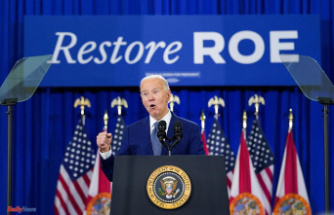Germany already has a tripartite. The Social Democratic Party (SPD), the Greens and the Liberals of the FDP have signed the Coalition Agreement on Tuesday that will frame the Government's decisions on the next four years, a framework program of 177 pages that does not contemplate responses to crises in foreign policy and Adventure frictions between the partners.
They went out in the press comparence that followed the signing of the contract, in a ceremony that barely lasted 20 minutes but endowed with the symbolism that he supposed his celebration at the Museum of the Future, next to the Bundestag, where tomorrow will take place the session of Investiture of Olaf Scholz as head of government.
The future Chancellor and Finance Minister in the latest Legislature of Angela Merkel gave way out the foreign affairs portfolio to the Greens. The holder of her will be the co-president of the Greens, Annalena Baerbock, who in this first appearance of the sealed tripartite broke its habit of appearing with her party colleague, Robert Habeck, a designated minister of economy and energy.
Scholz stated that his first trip abroad will be to Paris and later Brussels, consistent with the strong European vocation that his government will show. "Our policy will be Europeanist, we bet for a strong and sovereign Europe with a capacity of action in a multipolar and increasingly complex world," said Scholz, while renewing the transatlantic commitment adopted by Germany in the postwar period.
The next chancellor put the accent on cooperation and dialogue, but Habeck spoke on behalf of his colleague and the greens of a foreign policy that takes into account respect for human rights, the environment and compliance with the rule of law. He pointed directly China, Russia and, within the European Union, Hungary and Poland.
Scholz took the step by qualifying Poland from a "great democracy", a country with which Germany aims to maintain excellent neighborhood relationships and whose contribution to the whole EU is relevant. For Habeck, the EU is a club based on obligatory principles and values and that is what it tries to do, with all its right and responsibility, the European Commission.
The same differences with respect to China, a giant with which the future chancellor expects to achieve good cooperation and its partners see with critical eyes for their abuses to basic rights and minorities. Habeck, as a designated minister of economics and energy, added to that list the economic expansion of the Asian giant. "We're going to look with magnifying glass that Europe's sovereignty is not rhetorical but strategic," Habeck said. Translated to the Ministry of Him, that will be the defense of the economy and the strategic sectors of Germany and the EU of the candidity of Chinese purchases.
Relations with Russia are not predicted either. Merkel has been the only European leader capable of talking about you with Vladimir Putin, and the only one that has valued. Without a merkel in the government, the communication line has been cut and except for a sudden maturation of the young and inexperienced Baerbock is not to be foreseen that it can be imposed on the Veteran Sergey Lavrov.
For Moscow, the foreign policy of the German Greens is a nightmare. They have openly criticized the treatment of opponents, the persecution of non-governmental organizations, cyber attacks, their belligerent policy, their support for dictators, their permanent harassment to Ukraine and until the Nord Stream II gas pipeline, which will lead Russian gas directly to Germany Through the North Sea.
Scholz was questioned at the press conference for that gas pipeline and by the definitive closure of it to prevent Russia from using the gas as a pressure instrument. The future Chancellor repeatedly obvious the answer to affirm, finally, that "Ukraine maintains and will maintain its statute as a transit country" and that everything else "will already speak between us."
Fewer difficulties had the Social Democrat when qualifying the supposed Russian plans to invade Ukraine, the matter on which Putin will talk today with his American counterpart, Joe Biden. Scholz recalled that security and cooperation in Europe presuppose the principles that were negotiated in the distension policy and that remain in force nowadays. "This includes the inviolability of the borders. It is very, very important that no one rebound on the history books to redraw the borders," Scholz said.
He added that Germany, Europe and the United States observe with great concern the movements of troops on the Ukrainian border. "Therefore, it should be very clear that it would be a situation is ignorable if a threat there for Ukraine arose," she said.
Baerbock was not at the meeting with the press to assess the movements of Russian troops to the border with Ukraine, but Habeck took the opportunity to soften what his position has been, which is no other than supplying weapons to Ukraine to balance forces. "I always referred to defensive material, at interception systems, because I do not understand why Germany does not help the Ukrainian people to protect themselves. However, as far as the situation in Ukraine, the solution must be a diplomatic. So all Efforts of Europe should be addressed to reactivate existing formats, "said Habeck.
Baerbock is the second leader of the Greens who assumes the outdoor portfolio, after Joschka Fischer, who exercised as such under the government of Social Democrat Gerhard Schröder. And it has been precisely Schröder, at the present Lobist of Putin, who after signing the coalition agreement raised the voice to warn against a foreign policy change. "If you want to make a global climate policy, you have to have China and that greens should ensure a good relationship with that country of such economic and political importance," said former chancellor. The Mass Recipe for Russia, Turkey and Saudi Arabia. "None of those countries are going to impose their criteria, in foreign policy, more sensitivity is needed than they now show".
Schröder added that cooperation is not an acritic dialogue or implies renouncing the values themselves. "Germany should not give the impression of being an arrogant sermonier and politically fighting to isolate these states. For a very simple reason: we do not achieve absolutely anything. A moralizing foreign policy will not achieve anything," he said.
In national politics, differences in tripartite refer to the crisis created by the Coronavirus pandemic and on how to deal with it. Scholz opted for mandatory vaccination "because the vaccine is the way to the free society in which we all want to live." The Greens subscribe to the proposal, which will possibly come into force in February.
The leader of the Liberals and Designated Minister of Finance, Christian Lindner, for his part, recalled that compulsory vaccination is not part of the coalition agreement. "In what I believe is in the parliamentation of the measures against the Covid and therefore defending a debate about it in the Bundestag," Lindner reiterated and said he will not impose his deputies voting discipline.
Date Of Update: 07 December 2021, 09:55











